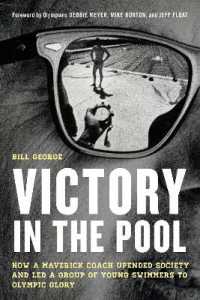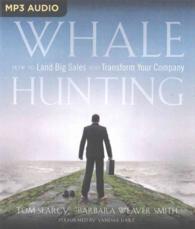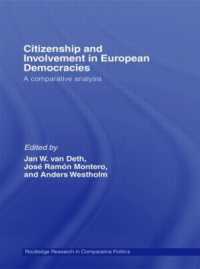Full Description
Documents are a rich yet often overlooked source of research data, offering unique insights across disciplines. This book provides a clear and practical guide to working with a wide variety of documents — including historical and contemporary, hard copy and digital - alone and in teams. Featuring contributions from leading international scholars, it unpacks the decisions researchers make when finding, selecting and analysing documents.
Organised into four sections, the book examines how researchers engage with seemingly mundane materials, explore documents in popular culture, apply multi-modal research techniques, and develop innovative approaches to dissemination. Each chapter offers real-world case studies, illustrating diverse research questions, theoretical perspectives and analytical methods.
Key features include:
- Step-by-step guidance on applying document analysis methods in research;
- Diverse case studies showcasing practical applications across fields;
- Engaging and accessible explanations that clarify complex approaches.
Filling a crucial gap in the methods literature, this essential text equips students and researchers with the tools to harness the full potential of documents in research.
Contents
1. Introduction - Aimee Grant and Helen Kara
Part I. Understanding the Past
2. Documentary Theatre as Participatory Social Research - Katarzyna Niziołek
3. Music and Sound in Documents: A Case Study of Music and Asylum History - Rosemary Golding
4. Folklore in Asian Martial Arts: Using Documents to Test the Theory of Martial Creation - George Jennings
Part II. Exploring the Machinery of Governance
5. Using Government Inquiry Documents in Research to Raise Voices Suppressed by Non-Disclosure Agreements - Victoria Pagan
6. Investigating Identity Documents Through Historical Ethnography - José Ragas
7. From Public Document to Engaging Experiences: Arts-Based Research and Knowledge Translation - Abigail Winter, Sarah Johnstone, Jen Seevinck, T.J. Thomson and Evonne Miller
Part III. Using Official Documents
8. Reflections on Using Charity Annual Reporting Data to Consider Questions of Representation - Helen Abnett
9. Unequal Bureaucracies in Practice: Analysing Documents Using Institutional Ethnography - Órla Meadhbh Murray
10. Using Documents in Research During Periods of Conflict and Political Turbulence - Anna J. Davis
Part IV. Exploring the Personal
11. Impactful Inquiry: How Insider Knowledge Enhances the Real-World Relevance of Research with Documents - Ella Houston
12. The Social Conditions of Possibility: Reading Medical Records as Documents of Practice - Max Edward Perry
13. Curating COVID-19: Creating an Illustrated Digital Archive with Diary and Interview Research Data - Kate Carruthers Thomas
14. Conclusion - Helen Kara and Aimee Grant








